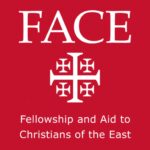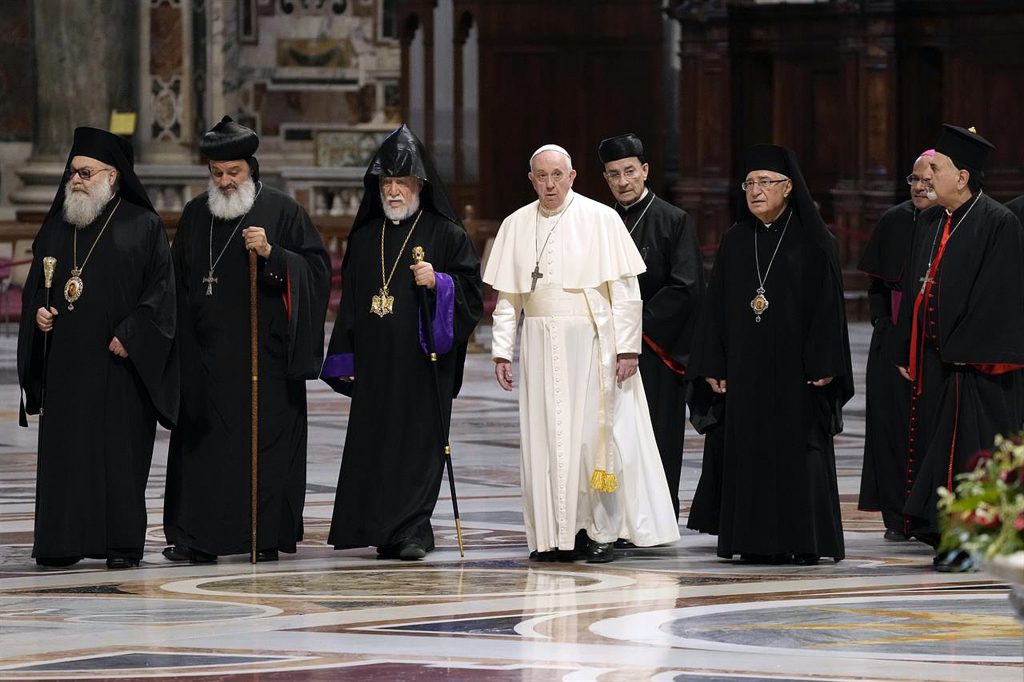Vatican News 01/07/2021
Christian leaders of Lebanon gathered around Pope Francis in the Vatican on Thursday for a Day of Prayer and Reflection for Lebanon.
By Robin Gomes
Some 10 senior leaders of the various Christian Churches and communities of Lebanon, along with their delegations, have arrived in the Vatican for a day of prayer and reflection with Pope Francis, on the current situation of the troubled Middle Eastern nation and its future, and to implore for the gift of peace and stability. The initiative is not to seek a political solution but to pray and read the signs of the time and respond to the cry of their people and alleviate their suffering.
Lebanon’s woes
The country is going through one of the world’s most severe economic crises in modern times, which is having serious social repercussions. The crisis, which began in late 2019, is rooted in decades of corruption and mismanagement by a post-civil war political class that has accumulated debt and done little to encourage local industries, forcing the country to rely on imports for almost everything.
A series of nationwide mass demonstrations in 2019 protested against a stagnant economy, unemployment, endemic corruption in the public sector, legislation that appeared to shield the ruling class from accountability and failures from the government to provide basic services such as electricity, water and sanitation. The country was thrown into a political crisis, with Prime Minister Saad Hariri resigning following the protesters’ demand for a government of independent specialists.
To add to its woes, a massive explosion on 4 August 2020 at a fertilizer storage facility in Beirut port tore through the city and reopened the country’s old wounds. The blast killed at least 190 people, injured over 6,000, caused over US$10 billion in property damage, and left some 300,000 people homeless.
Hariri was designated as Prime Minister in October 2020 but he has been at loggerheads with President Michel Aoun over cabinet positions and has failed to form a government so far.
Meanwhile, Lebanon continues to sink. Today, the Lebanese pound has lost more than 90% of its value against the US dollar since 2019 and inflation has skyrocketed, wiping out people’s wages and causing food prices to triple. With the Lebanese pound losing 95% of its purchase power, half of the population is believed to be living below the poverty line. Tight restrictions have also been placed on bank accounts, leaving people unable to withdraw their savings or transfer money abroad.
According to the latest World Bank report, Lebanon’s economic and financial crisis is likely to rank in the top 10, possibly top 3, most severe crises episodes globally since the mid-nineteenth century. In the face of colossal challenges, continuous policy inaction and the absence of a fully functioning government threaten the already dire socio-economic conditions and a fragile social peace with no clear turning point on the horizon.
To revive hope and peace
The July 1 Day of Prayer and Reflection for Lebanon, called by Pope Francis, is to help revive hope and peace in the country.
According to Cardinal Leonardo Sandri, prefect of the Vatican Congregation for Oriental Churches, who has organized the initiative, the purpose of the day is to “walk together”. The Church leaders will question themselves, reflect and pray together. They have brought to Rome the cry of their people. The theme of the day is, “The Lord God has plans for peace. Together for Lebanon.”
Starting off the Day of Prayer and Reflection for Lebanon, the nation’s Christian Church leaders gathered in the morning at Casa Santa Marta inside Vatican City where the Pope resides. The Holy Father greeted each one of them and members of their delegations, after which he walked to the nearby St. Peter’s Basilica with the Church leaders flanking him.
Inside, standing in front of the papal altar, which stands just above the tomb of St. Peter, the Pope intoned the Our Father prayer, which others joined in Arabic. After a moment of silent prayer, the Pope went down the steps to the tomb of St. Peter in the crypt below the papal altar where he placed a lighted candle. The others followed him placing their candles, with 10 candles in all. After a moment of silent prayer, the Pope led them out of the basilica through the crypt.
Currently, they are holding the first of their 3 closed-door meetings of the day in Clementine Hall of the Apostolic Palace. The day will be brought to a close with an ecumenical prayer service and a speech by Pope Francis at 6 pm.
Lebanon, a Mediterranean nation of 5 million, has the largest percentage of Christians in the Middle East and is the only Arab country with a Christian head of state, President Aoun. Christians make up a third of the population.
Pope Francis called on all men and women of goodwill to join the Day of Prayer and Reflection for Lebanon during his Sunday ‘Angelus” prayer on May 30, explaining the aim was to “pray together for the gift of peace and stability”. He urged for prayers so that Lebanon may have “a more serene future.”
Members of the Ecumenical Council of Eastern Churches of Lebanon, who are participating in the Day of Prayer and Reflection:
1. His Beatitude Cardinal Béchara Boutros, Maronite Patriarch of Antioch and All the East
2. His Beatitude Youhanna X, Greek Orthodox Patriarch of Antiochia
3. His Holiness Ignatius Aphrem II, Syrian Orthodox Patriarch of Antioch and All the East
4. His Beatitude Youssef Absi, Patriarch of Antiochia of the Greek-Melkites
5. His Holiness Aram I, Catholicos of Cilicia of the Armenians
6. His Beatitude Mor Ignatius Youssef III, Syriac Catholic Patriarch of Antioch
7. Reverend Joseph Kassab, President of the Supreme Council of the Evangelical Community in Syria and Lebanon
9. His Excellency Michel Kassarji, Bishop of Beirut of Chaldeans
10. His Excellency César Essayan, Apostolic Vicar of Beirut of Latins
11. Cardinal Leonardo Sandri, prefect of the Congregation for Eastern Churches
12. Archbishop Joseph Spiteri, Apostolic Nuncio to Lebanon

